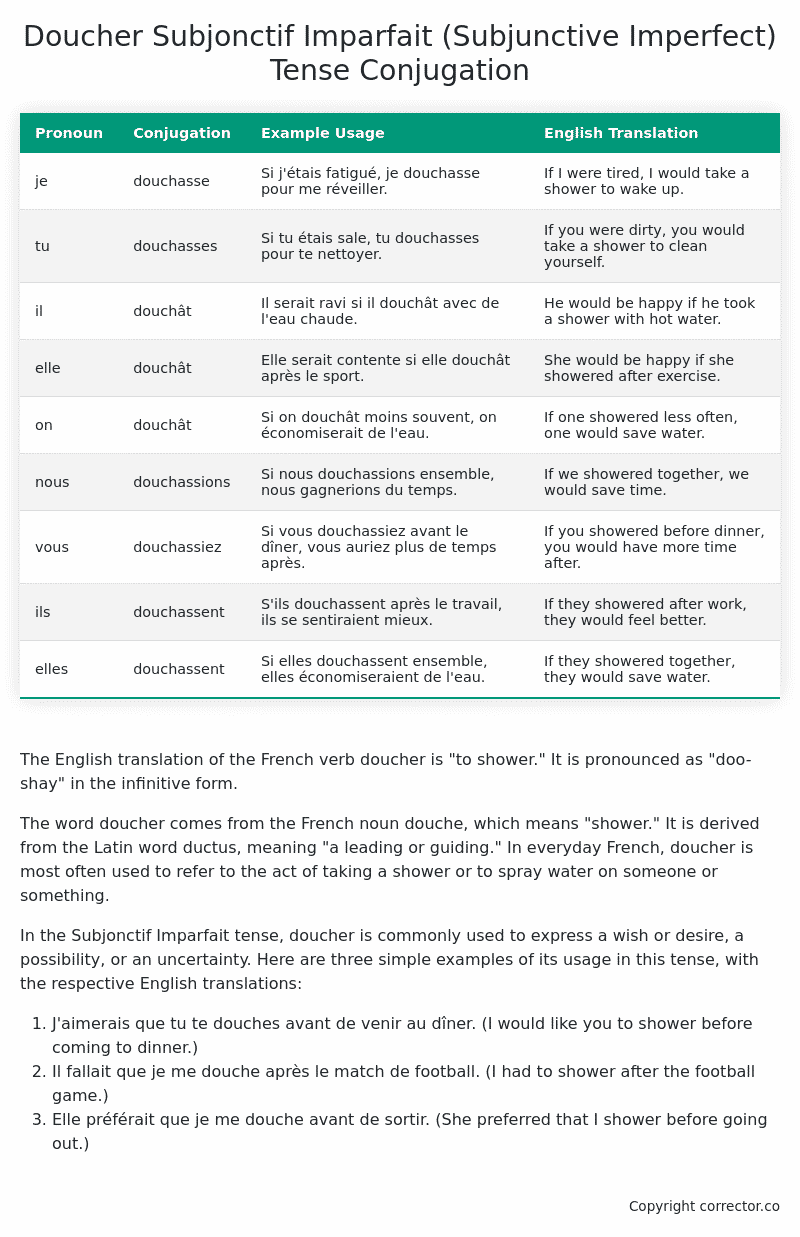Subjonctif Imparfait (Subjunctive Imperfect) Tense Conjugation of the French Verb doucher
Introduction to the verb doucher
The English translation of the French verb doucher is “to shower.” It is pronounced as “doo-shay” in the infinitive form.
The word doucher comes from the French noun douche, which means “shower.” It is derived from the Latin word ductus, meaning “a leading or guiding.” In everyday French, doucher is most often used to refer to the act of taking a shower or to spray water on someone or something.
In the Subjonctif Imparfait tense, doucher is commonly used to express a wish or desire, a possibility, or an uncertainty. Here are three simple examples of its usage in this tense, with the respective English translations:
- J’aimerais que tu te douches avant de venir au dîner. (I would like you to shower before coming to dinner.)
- Il fallait que je me douche après le match de football. (I had to shower after the football game.)
- Elle préférait que je me douche avant de sortir. (She preferred that I shower before going out.)
Table of the Subjonctif Imparfait (Subjunctive Imperfect) Tense Conjugation of doucher
| Pronoun | Conjugation | Example Usage | English Translation |
|---|---|---|---|
| je | douchasse | Si j’étais fatigué, je douchasse pour me réveiller. | If I were tired, I would take a shower to wake up. |
| tu | douchasses | Si tu étais sale, tu douchasses pour te nettoyer. | If you were dirty, you would take a shower to clean yourself. |
| il | douchât | Il serait ravi si il douchât avec de l’eau chaude. | He would be happy if he took a shower with hot water. |
| elle | douchât | Elle serait contente si elle douchât après le sport. | She would be happy if she showered after exercise. |
| on | douchât | Si on douchât moins souvent, on économiserait de l’eau. | If one showered less often, one would save water. |
| nous | douchassions | Si nous douchassions ensemble, nous gagnerions du temps. | If we showered together, we would save time. |
| vous | douchassiez | Si vous douchassiez avant le dîner, vous auriez plus de temps après. | If you showered before dinner, you would have more time after. |
| ils | douchassent | S’ils douchassent après le travail, ils se sentiraient mieux. | If they showered after work, they would feel better. |
| elles | douchassent | Si elles douchassent ensemble, elles économiseraient de l’eau. | If they showered together, they would save water. |
Other Conjugations for Doucher.
Le Present (Present Tense) Conjugation of the French Verb doucher
Imparfait (Imperfect) Tense Conjugation of the French Verb doucher
Passé Simple (Simple Past) Tense Conjugation of the French Verb doucher
Passé Composé (Present Perfect) Tense Conjugation of the French Verb doucher
Futur Simple (Simple Future) Tense Conjugation of the French Verb doucher
Futur Proche (Near Future) Tense Conjugation of the French Verb doucher
Plus-que-parfait (Pluperfect) Tense Conjugation of the French Verb doucher
Passé Antérieur (Past Anterior) Tense Conjugation of the French Verb doucher
Futur Antérieur (Future Anterior) Tense Conjugation of the French Verb doucher
Subjonctif Présent (Subjunctive Present) Tense Conjugation of the French Verb doucher
Subjonctif Passé (Subjunctive Past) Tense Conjugation of the French Verb doucher
Subjonctif Imparfait (Subjunctive Imperfect) Tense Conjugation of the French Verb doucher (this article)
Subjonctif Plus-que-parfait (Subjunctive Pluperfect) Tense Conjugation of the French Verb doucher
Conditionnel Présent (Conditional Present) Tense Conjugation of the French Verb doucher
Conditionnel Passé (Conditional Past) Tense Conjugation of the French Verb doucher
L’impératif Présent (Imperative Present) Tense Conjugation of the French Verb doucher
L’infinitif Présent (Infinitive Present) Tense Conjugation of the French Verb doucher
Struggling with French verbs or the language in general? Why not use our free French Grammar Checker – no registration required!
Get a FREE Download Study Sheet of this Conjugation 🔥
Simply right click the image below, click “save image” and get your free reference for the doucher Subjonctif Imparfait tense conjugation!

Doucher – About the French Subjonctif Imparfait (Subjunctive Imperfect) Tense
Formation
Common Everyday Usage Patterns
Interactions with Other Tenses
Subjonctif Présent
Indicatif Passé Composé
Conditional
Conditional Perfect
Summary
I hope you enjoyed this article on the verb doucher. Still in a learning mood? Check out another TOTALLY random French verb conjugation!


